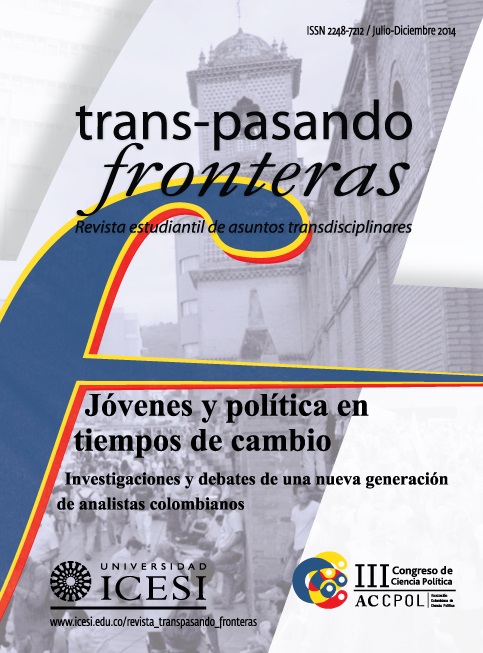The split between political science and political reality: the case of the Democratic Security
DOI:
https://doi.org/10.18046/retf.i6.1901Keywords:
Democratic security, Disciplinary development, Peace, conflict, Political context,Abstract
The democratic security policy adopted by President Alvaro Uribe during his term in office, resulted in a fundamental shift in the directions of the country after the failed peace process of the Pastrana government. In this sense, this paper seeks to demonstrate that the Political Science addressed the political phenomenon been contrary to the course of events, so that while the policy advocated by Democratic Security is an increase in the military offensive, the view from the Science Policy focused on how to get some peace talks or an agreed solution to the conflict. This, therefore, can be translated into a rejection of the prevailing point of view as an alternative approach in the study of national political reality. Political Analysis, Colombia International Political Role and Policy Studies published during the period from 2002 to 2012: To prove this, a literature review applied to scholarly articles in four journals of Political Science of the country is done.
Downloads
References
BARRIENTOS DEL MONTE, F. (2013). La Ciencia Política en América Latina. Una breve introducción histórica. Convergencia. Revista de Ciencias Sociales, Vol 20(Núm 61), 105–133.
BARRIENTOS DEL MONTE, F. (2013). La Ciencia Política en América Latina. Una breve introducción histórica. Convergencia. Revista de Ciencias Sociales, Volumen 20(Número 61), 105 – 133.
BUSHNELL, D. (2007). Colombia, una nación a pesar de sí misma (Primera edición). Bogotá: Planeta.
HARTO DE VERA, F. (2005). Ciencia Política Y Teoría Política Contemporánea: una relación problemática (Primera Edición). Madrid, España: Editorial Trotta.
MUNCK, G. (2007). Agendas y estrategias de investigación en el estudio de la política latinoamericana. Revista de Ciencia Política, Volumen 27(Número 1), 3–21.
MURILLO Castaño, G., y Ungar, E. (1999). Evolución y desarrollo de la Ciencia Política colombiana: Un proceso en marcha. Revista de Estudios Sociales, (Número 4), 36–57.
OLIVELLA, S. (2007). Del rigor en la Ciencia Política: algunas reflexiones sobre metodología de investigación. Colombia Internacional, (revista 66).
RAVECCA, P. (2010). La política de la Ciencia Política, ensayo de introspección disciplinar desde América Latina hoy. Revista América Latina, (9), 173–210.
REPÚBLICA DE COLOMBIA. (2003). Política de Defensa y Seguridad Democrática. Retrieved from http://www.oas.org/csh/spanish/documentos/Colombia.pdf
RUESCHEMEYER, D. (2006). Why and how ideas matter. In The Oxford Handbook of contextual political analysis (Primera edición). New york: Oxford University Press.
VROMEN, A. (2010). Debating Methods: Rediscovering Qualitative Aproaches. In Marsh, D y Stoker, G, Theory and Methods in Political Science (pp. 249–267). Nueva York: Palgrave Macmillan.
YIN, R. (2009). Case Study Research, design and methods (Cuarta edición). New york: SAGE.
Downloads
Published
Issue
Section
License
Trans-pasando Fronteras provides immediate open access to its content on the principle that making research freely available to the public supports a greater global exchange of knowledge.
© Authors hold copyright and publishing rights without restrictions but in accordance with the CC license.
All the material in this publication can be reproduced as long as reference is made to title, author and institutional source.







